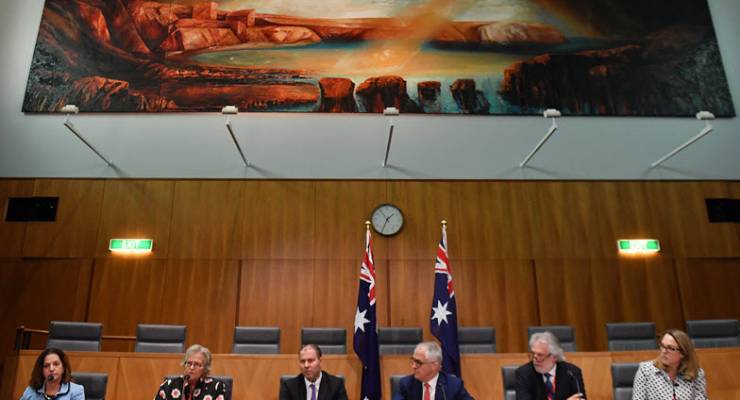
The generally positive reaction to the Turnbull government’s proposed National Energy Guarantee has been reminiscent of a Rorschach inkblot. This psychological test, popular in the 20th century but now largely discredited, required subjects to look at abstract symmetrical patterns and declare what they saw. Supposedly, a skilled tester could use the answer to determine the subject’s innermost fears, desires and psychological pathologies.
To bring the cultural reference up-to-date, it is also reminiscent of Harry Potter’s Mirror of Esired, in which everyone sees what the they most desire.
An eight page document with no figures is easy to interpret in many ways, especially one that has been hastily drafted to meet political imperatives. We have a National Energy Guarantee that will require renewable energy generators to invest in fossil fuels, and an emissions policy that will, one way or another, require fossil fuel generators to invest in emissions reductions. Coal is presented as the first example of a “dispatchable” source — that is, capable of being ramped-up rapidly from zero to full output to offset sudden outages — in the main document, while the supporting material hints at the reality that it is not really dispatchable in the sense that is needed.
Unsurprisingly, the culture warriors in the LNP and its supporting media, with the exception of the irreconcilable Tony Abbott have seen a lifeline for coal-fired power. On the other hand, describing the scheme as “innovative and elegant”, Bloomberg analysts Kobad Bhavnagri and Leonard Quong say it will promote renewables.
The designers of the scheme have claimed that it will deliver incentives to reduce carbon emissions without the need to breach the LNP taboo around a carbon price. Meanwhile other supporters such as the Grattan Institute say the scheme will inevitably lead to an “implicit” carbon price.
The large group within the LNP who opposed climate action have (correctly) seen the policy as a repudiation of our Paris commitments. In the absence of drastic policies to curb emissions in other areas, a reduction of 26% in electricity, combined with growing emissions else will lead us to fall far short of our commitments. By contrast positive assessments of the proposals from those outside the denialist camp have either glossed over the implications for carbon emissions growth or suggested that the policy could be revised later on to be more ambitious.
Most importantly, the positive reaction has been based on the idea that it is a ‘game-changer’ which will end what have been described as the “climate wars”.
The presentation of this argument has been a striking piece of false equivalence, suggesting that the proponents and opponents of action to reduce CO2 emissions are equally stuck in entrenched positions. This is an absurd caricature.
The advocates of action have successively indicated their willingness to accept an emissions trading scheme (the theoretical ideal), a carbon tax, a hybrid of the two, an emissions intensity scheme, a clean energy target or an extension and expansion of the renewable energy target. Every one of those options has been rejected by the denialists and culture warriors of the LNP.
A crucial element of the positive reaction among the political commentariat appears to be a continuing, and to my mind, inexplicable, faith in the brilliance of Malcolm Turnbull. As writer and pioneer blogger Tim Dunlop has observed, the same pattern emerged in 2016, when commentators fell over themselves to praise Turnbull’s brilliance in securing a double dissolution and an eight-week election campaign.
Turnbull has been remarkably successful in personal advancement and equally remarkable in policy failure. He has made a mess of every major policy issue he has touched, from the Republic to the Murray-Darling to the NBN.
Nowhere, however, has his failure been more catastrophic than in relation to energy and the environment. When he took office in 2015, he inherited a commitment to oppose a carbon tax and maintain the policy framework of Direct Action. My colleagues and I at the Climate Change Authority spent over a year working on a emissions intensity policy that could deliver significant reductions in emissions while staying within the terms of Turnbull’s deal with the culture warriors. Our efforts were ignored, as were those of the Finkel inquiry.
Everyone is aware of this track record. Yet, it seems Turnbull’s personal charm and quick wit, continue to entrance the commentariat. If the favorable spin leads this appalling plan to be adopted, the result will be the end of any serious hope for Australia to achieve the reductions in carbon emissions it has already promised, let alone those that will be needed in the future.








To me the NEG seems to favour existing generators over new generators.
I can’t see how it will encourage investment into new capacity, of any type.
A masterpiece of dithering as a political strategy. A document so vague that it can be re-interpreted to foil any meaningful attempts to address climate change while at the same time delivering maximum profit to existing (mainly coal-based) market participants.
It’s already working as intended: sowing vast confusion, sucking the motivation out of climate change activists and destabilising the future of renewables. We’re no longer talking about how to fix the environment, now we’re talking about how to fix the NEG. A small but very significant re-focussing of attention.
Journalists like Katherine Murphy are such a disappointment like you say John.
Surely Turnbull won’t be able to get away with scrapping subsidies to renewable energy when we know (but are not told by the MSM) that coal is subsidised. The continuing lie about SA’s power outage (never any mention of the outage caused by the Liddell coal power station last year) is never pursued by interviewers of Turnbull either.
Thanks for calling out the Emperor’s new clothes.
If my life depended on explaining this NEG announcement to someone I wouldn’t be capable – except to say it inspires nil confidence. Thankfully, the market (remember ‘The Market’, so beloved of Liberals?) will dictate what happens with our energy supply. I predict eager investment in renewables by the private sector despite the lack of rewards from our dinosaur government. Another example of the voters being more progressive than the dills in Canberra (as with same sex marriage policy).
It is hardly surprising that the NEG nuthin’ souffle has attracted positive comment from most journos. who have the tek nouse & numeracy of a dead parrot – words woven wonderfully will beguile them every time.
Personally I think that everything this current shower do in their final daze should simply be ignored.
Unfortunately there is not much prospect of better when the Alternative Liberal Party takes office – beholden as they are to the same big donors plus the blue collar unions – aas well as being utterly bereft of the vision thang.